A Historic Visit to Hawaii
- When
–
Statement by USJC President Irene Hirano Inouye
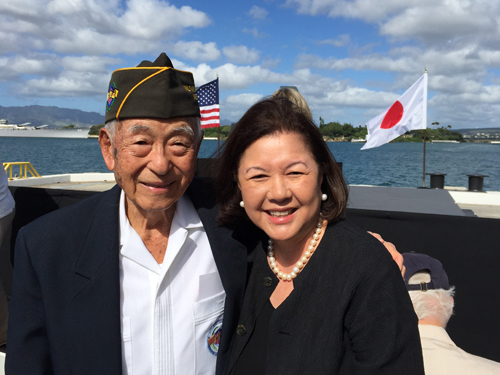
Today marked a historic and hopeful day in U.S.-Japan relations. Prime Minister Shinzo Abe made an unprecedented visit to Honolulu, which was highlighted by a special ceremony at Pearl Harbor with President Obama. Both reflected on the impact of the start of World War II, more than 75 years ago. A ceremony on the Arizona Memorial and the poignant remarks by the Prime Minister and the President at Pearl Harbor were somber and emotional, and reflected the importance of remembering history, committing to learn from it and using those lessons to build a better future.
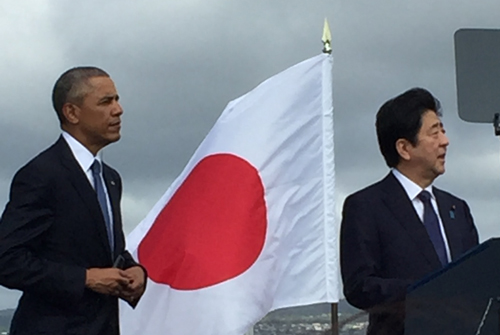
Prime Minister Abe spent two days in Honolulu, and many Council Leaders were invited to join events marking his historic visit. Sitting under the blue sky with 250 guests at the Pearl Harbor ceremony this morning, I could not help but be moved and inspired by the words, the courage and the leadership reflected by two of the world’s great leaders.
The presence of several World War II veterans and members of our U.S. military reminded us of the sacrifices and service so many Americans have made and continue to make. Both the Prime Minister and the President provided personal stories of individuals who had demonstrated ordinary—but at the same time extraordinary—acts in their duty to their countries.
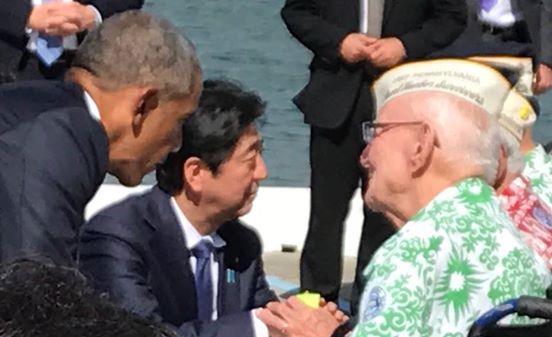
The Prime Minister’s visit to Pearl Harbor was preceded by President Obama’s historic visit to Hiroshima several months ago. The President’s reflections that day on the horror of war and the many who lost their lives in Hiroshima and Nagasaki were an important forerunner to today’s event. U.S. Ambassador Caroline Kennedy and Japanese Ambassador Kenichiro Sasae were present at both events, helping pave the way for history to be made.
On Monday evening, Japanese American organizations, including the U.S.-Japan Council (USJC), came together with the Japanese consulate to host 1,100 guests from the community to meet the Prime Minister, Foreign Minister Kishida and Defense Minister Inada. USJC had over 70 Council Leaders in attendance. At the reception, Prime Minister Abe thanked the Japanese American community in Hawaii for their support and friendship over the years. He paid tribute to the Issei generation and their perseverance in forging a new life in Hawaii.
Earlier that day, he had visited Makiki Cemetery, which includes a memorial to the first generation of Japanese immigrants that came to Hawaii in the 1860s. He paid tribute to the Nisei generation, including those who served in the U.S. military. The Prime Minister had also visited the National Memorial Cemetery at Punchbowl earlier in the day, joined by several veterans of the 442nd Regimental Combat Team (RCT).
During the reception, the Prime Minister spoke about his family’s long-standing friendship with Governor George Ariyoshi, who was part of the Occupation Forces in Japan after the end of the war. The Prime Minister acknowledged the many Japanese Americans, including one of his relatives, who sent food and supplies to family members in Japan after the War. Governor Ariyoshi, a Member of the USJC Board of Councilors, made remarks on behalf of the Japanese American community, thanking the Prime Minister for recognizing the important role that Japanese Americans have played in U.S.-Japan relations.
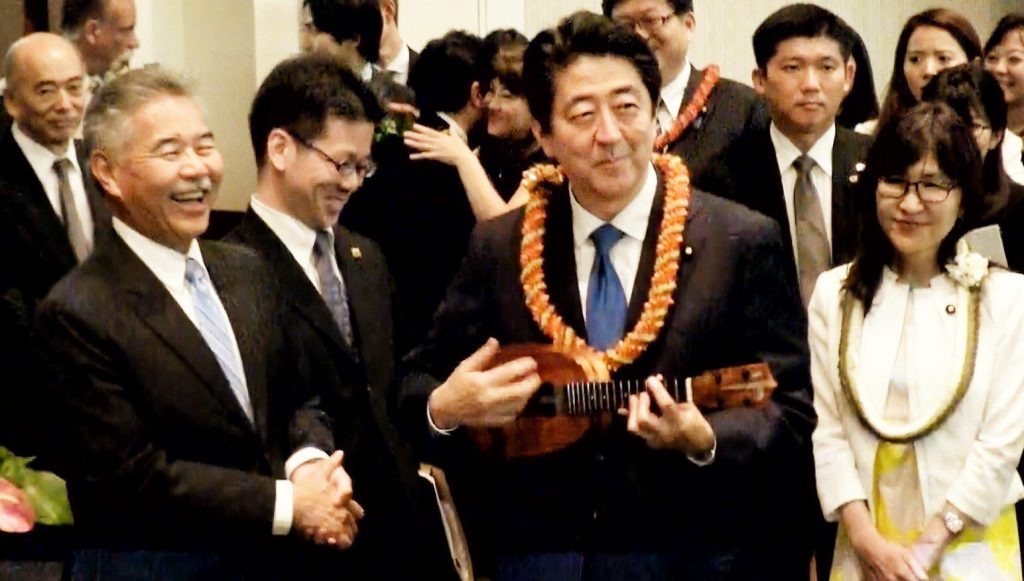
The dinner also featured remarks by Governor David Ige, who is the second Japanese American to serve as Governor of the state of Hawaii. Prime Minister Abe took the time to take photos with each of the 110 tables before the reception concluded.
Several Council Leaders were invited to join this morning’s events at Pearl Harbor, including Board of Councilors Senator Mazie Hirono, Congresswoman Colleen Hanabusa, Governor George Ariyoshi and Jean Ariyoshi, Board Chairman Dennis Teranishi, Board Member Wally Tsuha, former Board Member Colbert Matsumoto and Council Leaders Carole Hayashino and Chris Kubota. The 400-plus press corps in attendance at the ceremony included Council Leader Lori Matsukawa, covering the story for her television station in Seattle.
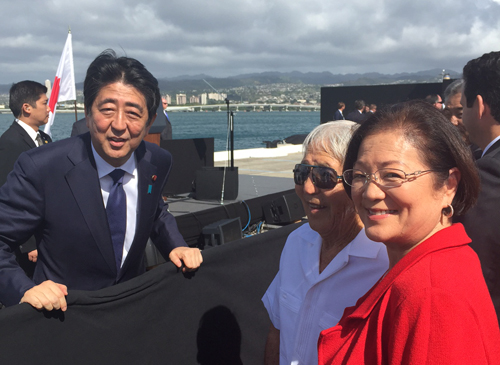
On a personal level, the Prime Minister visited the grave of my late husband, Senator Daniel Inouye, during his visit to Punchbowl National Cemetery on Monday. The Prime Minister laying a wreath and reflecting upon his many years of friendship with the Senator was a very special moment.
Today, President Obama recognized the service of our Japanese American veterans in the 100th Infantry Battalion and the 442nd RCT. The President commented on the Senator’s service in the 442nd RCT, their shared service in the U.S. Senate and his lifelong public service. I am grateful to both Prime Minister Abe and President Obama for their remembrances. I am sure Dan was looking down today, smiling and humbled, as the leader of his country of birth and the leader of his country of ancestry came together in his home state of Hawaii, not only to remember but also to recommit to the importance of the U.S.-Japan alliance.
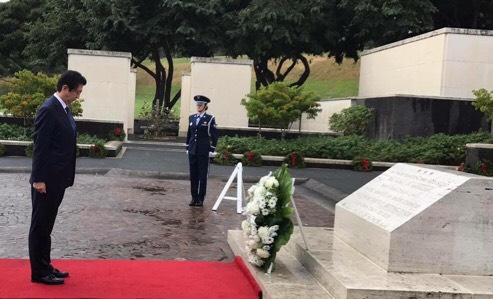
USJC’s mission is to build lasting people-to-people relationships at all levels to ensure a strong U.S.-Japan relationship. The importance of these values was also evident in both leaders’ remarks.
Prime Minister Abe reflected:
“It is my wish that our Japanese children, and President Obama, your American children, and indeed their children and grandchildren, and people all around the world, will continue to remember Pearl Harbor as the symbol of reconciliation.”
(Click here for the full text of the Prime Minister’s speech.)
President Obama reflected:
“As nations and as people, we cannot choose the history that we inherit. We can choose what lessons to draw from it. We use those lessons to charter our own future.”
(Click here for the full text of the President’s speech.)
For the U.S.-Japan Council, this week’s events reaffirmed our commitment to find productive ways to build new connections and sustain the foundation that has been built by those before us. We will continue to invest in the next generation of leaders, who we hope will not only remember the past but also chart new ways to ensure that we maintain peace and prosperity in the Asia Pacific region. We thank Prime Minister Abe and President Obama for their friendship and leadership that have marked one of the most important periods in the history of U.S.-Japan relations.
—Irene Hirano Inouye
President, U.S.-Japan Council
See also: